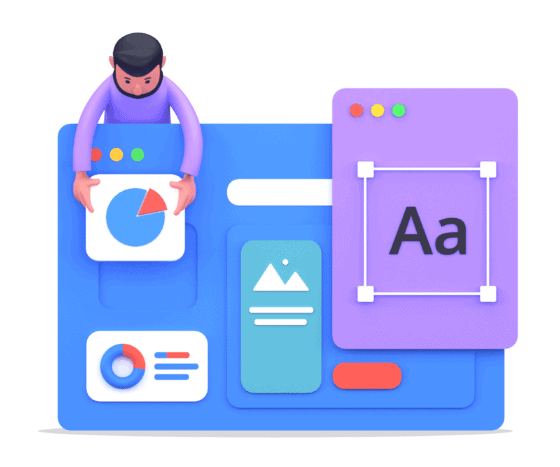
Drupal is an open-source content management system (CMS) favoured for its ability to support the development of complex and varied online platforms. Its extensive flexibility and strong security features make it a popular choice for large-scale enterprises and government agencies. These organisations often have intricate needs that Drupal can satisfy through its modular approach, allowing the construction of bespoke, powerful websites.
However, for small businesses, this same flexibility can introduce challenges. The comprehensive nature of Drupal requires a significant commitment in terms of time and resources to fully harness its capabilities. While the core system provides a solid foundation, the true strength of Drupal lies in its customisation potential, which typically demands a higher level of technical skill to implement effectively.
In contrast, we often find that alternative CMS platforms like WordPress are better suited for small businesses. They tend to offer more user-friendly interfaces and simpler setups, which can result in quicker website launches and easier content management for those with limited technical expertise.
Evaluating the Drupal pros and cons is essential for providing an unbiased analysis and determining if it’s the right CMS for your specific needs and projects.
Key Takeaways
- Complexity and Expertise Requirements: Drupal’s robust and flexible system is accompanied by a complexity that can be overwhelming for small business owners. It often requires web developer skills to navigate and make the most of its extensive features, which can be a significant hurdle for those without a development background. This complexity can translate into a steep learning curve and potential reliance on professional developers, which might not be feasible for small businesses with limited budgets or technical staff.
- Resource Intensive: The power of Drupal’s customisation capabilities comes at a cost; it can be resource-intensive on servers, and also in terms of the time and financial investment needed to build and maintain a Drupal site. Small businesses might find that the ongoing costs for specialised hosting, development, and maintenance exceed their budgetary constraints.
- Accessibility and User-Friendliness: While Drupal is a highly capable CMS for complex and content-rich websites, its user interface and administrative backend are not as intuitive as some of its competitors, like WordPress. This can make routine content updates and site management more challenging for small business owners who need to focus on their business rather than on managing complex content management systems.
Table of Contents

What Is Drupal CMS?
Drupal is a content management system prized for its adaptability and scalability, frequently chosen for both large and resource-intensive websites. It serves as the foundation for over 9% of the most-visited websites globally, thanks in part to the extensive library of over 42,000 Drupal modules, including a wide range of contributed modules. These modules significantly enhance Drupal’s flexibility and scalability, allowing users to tailor a Drupal website to their specific needs and expand its capabilities.
Core Features
Drupal is renowned for its extensive core features, which include user account registration and management, menu handling, RSS feeds, system administration, and page layout customisation. Its ability to extend with Drupal Modules, the addition of themes for aesthetic changes, and content creation and organisation tools make it a comprehensive platform.
Who Uses Drupal Websites?
A variety of sectors make use of Drupal for their online presence. These include digital businesses, non-profit organisations, and government agencies. Its reliability and the fact that it is open-source make it an appropriate platform for entities that value transparency in their operations and require complex websites in an adaptable online system.
Key Advantages of a Drupal Website
Exploring Drupal’s advantages reveals its strength in flexibility, security, scalability, and community resourcefulness. These qualities align well with organisational demands for robust online solutions. A key component of Drupal’s security strength is the Drupal Security Team, dedicated to identifying and rectifying potential security holes or existing vulnerabilities within the CMS. Their vigilance in monitoring Drupal’s extensive library of open-source modules, and recommending those with security coverage, significantly contributes to the platform’s robust security posture.
Open-Source Accessibility
Drupal’s open-source nature invites enthusiasts and professionals alike to exploit its extensive and adaptable framework. The platform’s modular design means that developers can integrate custom features as necessary, fostering innovation without incurring licensing fees.
Robust Security
A priority for any online presence is security—Drupal excels in this area. With a consistent record of responding promptly to vulnerabilities, the platform secures a reputation for reliability. Drupal’s proactive approach to security issues brings peace of mind for businesses and developers.
Community Support
Drupal benefits from an expansive and active community offering assistance and exchanging ideas. Developers, users, and organisations contribute to and draw from a comprehensive pool of knowledge. This support network enhances Drupal’s capabilities and offers extensive resources for troubleshooting and development. Skilled web developers play a pivotal role in this ecosystem, with each web developer contributing to the web development and software enhancements within the Drupal community, ensuring the platform remains dynamic and responsive to the needs of its users.
Scalability and Performance
Drupal is engineered to effectively manage substantial content volumes and high user traffic. This makes it a suitable option for complex websites that are content-heavy. Its performance is optimised through proper hosting and expert tuning, keeping Drupal responsive under a variety of conditions.
Challenges of Using Drupal
When integrating Drupal as a content management system, several challenges quickly stand out. These hurdles include the complexity of the platform, hosting requirements, the costs entailed in development, the Drupal learning curve, and factors impacting performance.
Technical Complexity
Drupal is recognised for its flexibility and scalability, but this comes with an inherent complexity. Users often encounter a steep learning curve, especially those without a background in web development. The process of mastering Drupal’s interface and multitude of features demands time and dedication.
Hosting Requirements
Drupal’s execution depends significantly on the hosting environment. Optimum performance may necessitate a more advanced hosting setup, which could increase hosting costs. Shared hosting environments might not suffice for high-traffic Drupal sites, necessitating investment in VPS or dedicated hosting solutions.
Development Costs
While Drupal’s extensibility is one of its strengths, it also means that customising the platform can be time-consuming and expensive. Developing specialised functionality or custom modules requires the extensive coding knowledge of a Drupal developer and can therefore lead to higher development costs, posing a challenge for organisations with constrained budgets.
Performance Factors
Performance is a primary consideration in website management. A standard Drupal installation, without proper optimisation, could result in slower response times on dynamic websites. This is particularly true when integrating elaborate modules or when a website is hosted in shared hosting environments, which may lack the resources to efficiently support Drupal’s demands.
Each challenge poses its own set of issues to overcome, requiring careful planning and resources to ensure that Drupal operates effectively for your organisation’s needs.

Drupal for Various Sectors
Drupal serves a wide array of sectors, accommodating their diverse digital needs with powerful content management and customisable capabilities that support both B2B and B2C models, as well as non-profit requirements, educational frameworks, and government standards.
Digital Business
For digital businesses, Drupal boasts an infrastructure that supports versatile e-commerce activities and user interaction for enterprise level websites. It serves B2B and B2C enterprises effectively with its high-security standards and the ability to personalise customer experiences. This CMS supports intricate user permissions, allowing businesses to manage who can access and edit different parts of their site.
Non-profit Organisations
Non-profits find Drupal beneficial because it offers various tools for managing donations, fundraising efforts, and volunteer coordination. Its support for multi-language websites is advantageous for reaching a broader audience. Additionally, its cost-effectiveness aligns well with the budget constraints often faced by non-profit entities.
Educational Institutions
Drupal aids educational institutions by offering a platform that manages and disseminates educational content to students and faculty. Its capacity to scale can accommodate the varying sizes of institutions, from small colleges to large universities. The customisable nature of Drupal helps create distinct online environments that aid in teaching and learning.
Government Agencies
Government agencies utilise Drupal for its comprehensive content management system, vital for maintaining expansive websites while adhering to strict compliance and accessibility standards. The platform’s flexibility in content structuring and permission settings contributes to secure information dissemination and staff workflow management.
Drupal Security
In the world of website security, Drupal is recognised for its strong security protocols and community vigilance.
Security Protocols
Drupal’s security protocols are comprehensive and proactive in addressing vulnerabilities. Its core system is designed with advanced security features, which are rigorously maintained and regularly updated. The security team at Drupal consistently works to identify and patch any potential security vulnerabilities, providing regular updates that administrators apply to their sites. Additional security modules are available for enhanced protection against online threats.
Community Vigilance
The vigilant Drupal community contributes significantly to the platform’s security. With an active and engaged user base, potential threats are quickly reported and often fixed before causing major damage. This collective effort creates a safety net where experienced developers and users collaborate to spot and resolve security concerns. Drupal benefits from this collective security scrutiny, reinforcing its position as a secure content management system.
Multilingual Capabilities of Drupal
Drupal’s support for different languages is an essential feature for non-profit organisations, providing tools for fundraising and volunteer management in various languages.
Language Support
Drupal has extensive language support capabilities, enabling the creation of websites in numerous languages, including those with right-to-left text direction, such as Arabic, Hebrew, and Farsi. The detection of a user’s preferred language is facilitated by several methods, such as IP address, browser settings, URL, and user session management. Non-profit organisations utilise these features to communicate effectively with their diverse audience base, ensuring that content aligns with the varied linguistic needs of users globally.
- Supported Languages: Includes right-to-left languages by default
- Preferred Language Detection: IP address, browser settings, URL, session management
Internationalisation
The platform’s internationalisation extends its multilingual capabilities, allowing for customisation and adaptation to various geographical locations. Drupal’s core includes features that support the development of mobile applications in multiple languages, which is particularly beneficial for non-profits that aim to engage a broad audience base via smartphone access. These capabilities underscore Drupal’s advantages for organisations aiming to create an inclusive digital presence.
- Mobile App Support: Stable operation on mobile platforms in different languages
- Adaptation to Markets: Local customisation for global engagement
Move your existing website to a better platform – where you remain in control.
Ready to level up your online presence? Our tailored WordPress migration service can make it happen. Contact us to start your migration project.

Customising Drupal
In Drupal, customisation is a central feature, allowing for a diverse range of modifications through modules and themes, however, these modifications will need some developer assistance to implement. Its extensive library of modules and themes makes it a powerful tool for website development, catering to various industries with its flexibility and customisation options.
Modules and Extensions
Drupal shines with its extensive library of modules, which serve as plugins to extend the system’s capabilities. Users can enhance their sites by selecting from a number of available modules, ranging from SEO optimisation to sophisticated security enhancements. The platform’s flexibility is evident in its modular design, which supports a wide array of functionalities according to the user’s specifications. Developers appreciate Drupal for this flexibility, as they can integrate custom-made modules to fulfil specific requirements.
- Flexibility: Modules are at the core of Drupal’s adaptability, with options available for most needs.
- Custom Features: Tailoring a Drupal site with custom modules is largely straightforward, providing desired features.
Theme Development
Regarding appearance and layout, Drupal’s theme layer offers a powerful foundation for crafting visually appealing designs. It facilitates a process where developers can apply existing themes or create new ones to give their website a distinct appearance. The system’s theming engine enables a detailed level of customisation, handling everything from responsive design to interactive elements.
- Aesthetic Customisation: Themes control the visual aesthetics, which can be fine-tuned or overhauled completely.
- Responsive Design: Most themes support responsive principles, ensuring a consistent experience across devices.
The duality of modular extensibility and theming capabilities embodies the customisation strengths of Drupal, making it a solid choice for developers who demand versatility in crafting their web presence.
Performance Optimisation
Optimising performance in Drupal is critical for maintaining fast response times and handling high volumes of traffic and content effectively.
Caching Strategies
Caching is a method used to store frequently accessed data temporarily to reduce load times and server load. Drupal offers several caching layers:
- Page Caching: Saves the entire HTML of each page. Ideal for sites with more static content.
- Block Caching: Individual blocks can be cached; useful for elements that do not change often.
- Entity Caching: Caches particular entities like nodes or users.
- Views Caching: For content listings created with the Views module, this can greatly decrease database load.
Employing a combination of these strategies can significantly enhance site performance.
Server Configuration
Proper server configuration is essential for Drupal to operate effectively:
- PHP-FPM: Using PHP-FPM improves resource management and can enhance site responsiveness when configured correctly.
- Database Optimisation: Regularly optimise database tables to prevent slowdowns.
- Server Scaling: As site traffic increases, it might be necessary to scale server resources effectively to accommodate the growing number of requests.
Scalability is one of Drupal’s strengths, handling substantial content and traffic seamlessly when configured properly. However, performance can suffer on shared hosting or with complex modules, necessitating careful optimisation.

Comparing Drupal with Alternatives
When we look at Drupal’s position among content management options, it quickly becomes clear that while powerful for large-scale enterprise sites, its complexity presents challenges for small business owners when compared to other content management systems (in fact, at Chillybin we only use WordPress to make it easy for our clients to make simple changes and manage content).
This insight leads to the consideration of various alternatives and their alignment with different user needs, highlighting the differences in learning curve, power and flexibility, extensibility and customisation, cost-effectiveness, and infrastructure requirements.
Comparing Drupal with Other Content Management Systems
Drupal vs WordPress: WordPress presents an arguably more accessible solution for small businesses due to its simple user interface and extensive plugin system. Here’s a short comparison:
- Drupal:
- Pros: Highly flexible with strong taxonomy for complex content structuring, ideal for large, multifaceted sites.
- Cons: Requires technical proficiency, has a steeper learning curve which can be challenging for novice users.
- WordPress:
- Pros: User-friendly, wide range of themes and plugins, and generally easier content management for non-developers.
- Cons: Might be less suited for highly intricate websites with many custom content types and views.
Other alternatives also include Joomla, which, like Drupal, caters to developers but with somewhat easier user management, and Headless CMS, providing greater freedom for front-end development while lacking user-friendly backend interfaces.
Alternative Website Builders
For those without deep technical skills or the budget to hire developers, alternatives such as Wix and Squarespace offer drag-and-drop editors — simplifying the creation and management of websites.
- Wix and Squarespace:
- Pros: Intuitive design, no coding needed, and a variety of templates.
- Cons: Less flexibility, and do not support complex site structures.
Proprietary CMS solutions cater to specific needs with out-of-the-box functionality, though they often lock in users with their platform-specific constraints.
In conclusion, Drupal is a powerful choice for those with the skills to utilise it, but for small business owners, the ease of WordPress will often provide a better fit.
If you currently have a website on a platform such as Drupal, Wix, or Squarespace and would like to move it to WordPress, our Website Migration service is the perfect solution for you.
Alternatively, if you would like to build a new website on WordPress, contact us today so the team at Chillybin can bring your dream to life.




